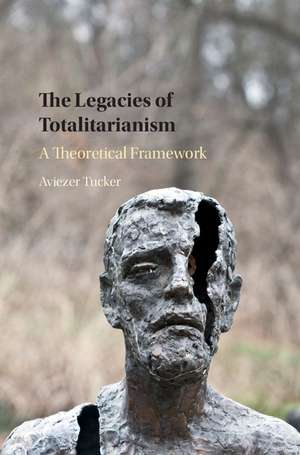The Legacies of Totalitarianism: A Theoretical Framework
Autor Aviezer Tuckeren Limba Engleză Hardback – 14 oct 2015
| Toate formatele și edițiile | Preț | Express |
|---|---|---|
| Paperback (1) | 205.24 lei 6-8 săpt. | |
| Cambridge University Press – 23 noi 2022 | 205.24 lei 6-8 săpt. | |
| Hardback (1) | 695.93 lei 6-8 săpt. | |
| Cambridge University Press – 14 oct 2015 | 695.93 lei 6-8 săpt. |
Preț: 695.93 lei
Preț vechi: 781.95 lei
-11% Nou
Puncte Express: 1044
Preț estimativ în valută:
133.17€ • 139.39$ • 110.84£
133.17€ • 139.39$ • 110.84£
Carte tipărită la comandă
Livrare economică 01-15 aprilie
Preluare comenzi: 021 569.72.76
Specificații
ISBN-13: 9781107121263
ISBN-10: 1107121264
Pagini: 272
Dimensiuni: 155 x 235 x 20 mm
Greutate: 0.57 kg
Editura: Cambridge University Press
Colecția Cambridge University Press
Locul publicării:New York, United States
ISBN-10: 1107121264
Pagini: 272
Dimensiuni: 155 x 235 x 20 mm
Greutate: 0.57 kg
Editura: Cambridge University Press
Colecția Cambridge University Press
Locul publicării:New York, United States
Cuprins
Introduction; 1. The adjustment of elite rights to interests; 2. Post-totalitarian rough justice; 3. Rough justice: post-totalitarian retribution; 4. Rough and shallow: post-totalitarian rectification; 5. The new politics of property rights; 6. Old to new totalitarianism: post-totalitarian higher education; 7. Short-circuiting reason: the legacies of post-totalitarian thinking; Conclusion. Only dissidents can save us now.
Recenzii
'Discussion about post-communist Central and Eastern Europe has long been tethered to imprecise, ideologically driven thinking. This book reframes the conversation in a manner befitting the region's unique history and plugs a lingering gap in political theory.' Benjamin Cunningham, Prague correspondent, The Economist
“Only dissidents can save us now. This will be the one truly positive legacy of totalitarianism (maybe together with public transportation)', writes Aviezer Tucker. His book deals with the negative aspects of this legacy, though – and there are plenty of them, not only in the East. Essential reading at a time when the history of Central and Eastern Europe seems unfinished, again.' Aleksander Kaczorowski, editor, Aspen Review Central Europe
'In this superb and long-awaited book, Aviezer Tucker writes from a deep understanding of totalitarian and post-totalitarian regimes, mainly under Communism but also elsewhere. In his vivid phrase, 'Totalitarianism is not dead, it merely disintegrated. Its pieces are spread all over and they can be put back together again'. Ranging from painstaking empirical documentation to acute conceptual analyses, written with passion and irony, the book will undermine the complacency and wilful blindness of many Western intellectuals and politicians.' Jon Elster, Robert K. Merton Professor of Social Science, Columbia University
'Aviezer Tucker does not let us forget the totalitarian past - and with good reason. In this admirably comprehensive book, he revisits the much-debated (but later ignored) notions of totalitarianism, late totalitarianism, and post-totalitarianism and offers a powerful, thought-provoking interpretation of their legacies. Tucker discusses interrelated issues in elite change, lustration, transitional justice, property rights, and the configuration of post-totalitarian thinking in a way that opens new insights for academic debates. This book is a welcome contribution to studies in both political philosophy and historical sociology.' András Bozóki, Central European University
'Tucker's book is an exciting read. It will be of interest to political theorists and to those who work on issues of transitional justice in a range of geographical and historical contexts.' Martin K. Dimitrov, The Review of Politics
“Only dissidents can save us now. This will be the one truly positive legacy of totalitarianism (maybe together with public transportation)', writes Aviezer Tucker. His book deals with the negative aspects of this legacy, though – and there are plenty of them, not only in the East. Essential reading at a time when the history of Central and Eastern Europe seems unfinished, again.' Aleksander Kaczorowski, editor, Aspen Review Central Europe
'In this superb and long-awaited book, Aviezer Tucker writes from a deep understanding of totalitarian and post-totalitarian regimes, mainly under Communism but also elsewhere. In his vivid phrase, 'Totalitarianism is not dead, it merely disintegrated. Its pieces are spread all over and they can be put back together again'. Ranging from painstaking empirical documentation to acute conceptual analyses, written with passion and irony, the book will undermine the complacency and wilful blindness of many Western intellectuals and politicians.' Jon Elster, Robert K. Merton Professor of Social Science, Columbia University
'Aviezer Tucker does not let us forget the totalitarian past - and with good reason. In this admirably comprehensive book, he revisits the much-debated (but later ignored) notions of totalitarianism, late totalitarianism, and post-totalitarianism and offers a powerful, thought-provoking interpretation of their legacies. Tucker discusses interrelated issues in elite change, lustration, transitional justice, property rights, and the configuration of post-totalitarian thinking in a way that opens new insights for academic debates. This book is a welcome contribution to studies in both political philosophy and historical sociology.' András Bozóki, Central European University
'Tucker's book is an exciting read. It will be of interest to political theorists and to those who work on issues of transitional justice in a range of geographical and historical contexts.' Martin K. Dimitrov, The Review of Politics
Descriere
This book provides the first political theory of post-Communist Europe, discussing liberty, rights, transitional justice, property, privatization, and rule of law.












